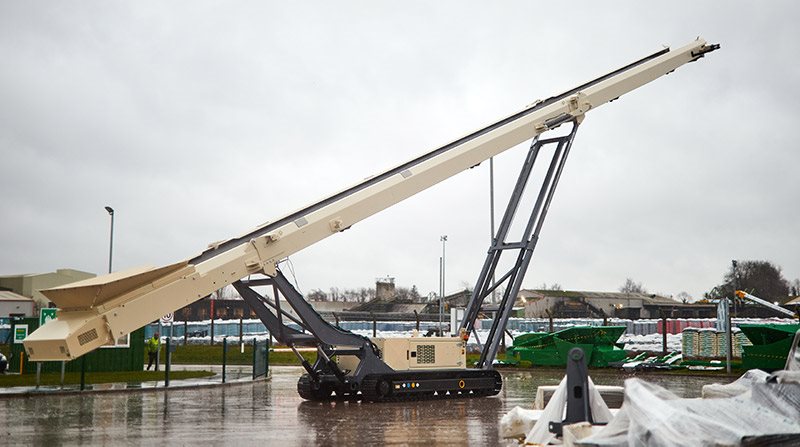In the material handling and logistics world, one piece of equipment plays an incredibly pivotal role in ensuring the smooth and efficient movement of goods from one point to another – the conveyor. More specifically, in this article, we will delve into an advanced and versatile type of conveyor: the mobile conveyor. This innovation in the industrial sector has opened up new horizons in terms of flexibility, convenience, and efficiency. Let’s dissect what exactly a mobile conveyor is, its different forms, and its wide range of applications.
Understanding Mobile Conveyors
A mobile conveyor is a type of material handling equipment that can be moved or transported around a site as needed. Compared to traditional fixed conveyors, which are stationary and require extensive relocation effort, mobile conveyors are designed to bring the machine to the job rather than the other way around. Equipped with wheels or tracks, these systems provide a way to conveniently move bulk materials like sand, gravel, and even rock, saving time and labor costs.
Tracked Mobile Conveyor
As the name suggests, a tracked mobile conveyor is a conveyor system fitted with tracks similar to those on a tank or bulldozer. This system is designed for challenging terrains where a wheeled conveyor might struggle. With robust and heavy-duty tracks, these conveyors can move across uneven ground, on steep inclines, or in areas with obstacles. Tracked mobile conveyors excel in quarries, mines, and construction sites where the terrain can be unpredictable.
Mobile Portable Conveyor
Mobile portable conveyors, on the other hand, are smaller, more compact versions of mobile conveyors. These units are often used in spaces where there is a need to move the conveyor around frequently. These systems typically come equipped with caster wheels for easy maneuverability. Mobile portable conveyors are ideal for use in warehouses, loading docks, and other industrial settings where materials need to be moved over short distances regularly.
Mobile Rock Conveyor
A mobile rock conveyor is designed to handle large, abrasive materials such as rocks and ores. This type of mobile conveyor often features a robust design to withstand the harsh conditions of mining and quarrying operations. Equipped with heavy-duty belts and frames, mobile rock conveyors can handle the weight and abrasion of large rocks while transporting them over considerable distances.
Operation and Maintenance of Mobile Conveyors
Understanding how to operate and maintain mobile conveyors is crucial to optimize their performance and lifespan. As with any mechanical system, these conveyors require routine inspections and maintenance to keep them functioning optimally.
The operation of mobile conveyors depends on the specific type. However, generally, it involves adjusting the conveyor to the correct height and angle, loading the material onto the conveyor belt, and using the control system to start the belt. The machine then transports the material to its designated location.
Maintenance often entails regular cleaning to remove any debris that could interfere with the conveyor’s operation. It also includes checking the condition of the belts, wheels, or tracks and the control system. The belts should be checked for signs of wear and tear, the wheels or tracks for any signs of damage, and the control system for proper functioning.
Furthermore, the lubrication of moving parts is necessary to prevent friction and wear, while any damaged or worn-out components should be replaced promptly.
Proactive maintenance and correct operation not only extend the mobile conveyor’s life but also prevent potential operational downtime, keeping productivity levels high.
Advantages of Mobile Conveyors
Mobility is the key advantage of these conveyors. They can be easily transported around a facility, allowing for a more flexible approach to material handling. The mobility of these conveyor systems makes them an ideal solution for businesses that need a dynamic and adaptable method for moving materials.
Another advantage is the potential for decreased labor costs. Mobile conveyors can handle large quantities of materials, effectively reducing the need for manual labor. This can lead to increased efficiency, cost savings, and improved safety, as there is less risk of injury from manual lifting.
Furthermore, these conveyors are versatile and can handle a wide variety of materials. From delicate items in warehouses to heavy, rough materials in quarries, there’s a mobile conveyor system designed to meet the needs of almost any industry.
Choosing the Right Mobile Conveyor for Your Business
Making the right choice when selecting a mobile conveyor for your business can be critical. It affects your operations, productivity, and, ultimately, your bottom line. Here are some essential factors to consider when choosing the right mobile conveyor for your needs.
Understanding Your Requirements
Start by understanding the specific needs of your operation. What materials will you be moving? How heavy and large are these materials? What kind of environments will the conveyor be operating in? Knowing your operational requirements can guide you toward the right type of mobile conveyor, whether it be a tracked mobile conveyor for rough terrains, a mobile portable conveyor for frequent relocations, or a mobile rock conveyor for handling heavy materials.
Capacity
Next, consider the capacity of the conveyor. How much material do you need to move per hour or day? If you have high-capacity needs, you will need a conveyor that can handle the volume without straining its components or slowing down your operations.
Flexibility and Portability
The mobile conveyor’s flexibility and portability should align with your operational needs. A portable conveyor with higher portability may be more suitable if your operations are spread over a large area or across multiple sites.
Durability and Maintenance
Consider the durability of the machine. Look for a conveyor designed to withstand the wear and tear of your operations. Also, understand its maintenance needs. A conveyor requiring frequent expensive maintenance can eat into your operational budget, even if it initially seems cheaper.
Budget
Lastly, consider your budget. While choosing a conveyor that fits your needs is important, it should also fit within your financial capacity. Factor in not only the initial purchase cost but also the long-term operating and maintenance costs.
Choosing the suitable mobile conveyor is a balance between your operational needs, the conveyor’s capacity, flexibility, durability, and budget. It’s about making decisions that align with your current needs and anticipate future growth and changes.
Conclusion
From the tracked mobile conveyor treading confidently over uneven terrains, the handy mobile portable conveyor providing flexibility in confined spaces, to the robust mobile rock conveyor dealing with hefty loads, the mobile conveyor family offers a wide array of solutions tailored to varied industrial needs.
These conveyor systems have revolutionized how businesses handle and transport materials, offering increased efficiency, improved safety, and significant cost savings. Understanding their capabilities and applications is vital for industries striving to optimize operations in this ever-evolving technological landscape.

